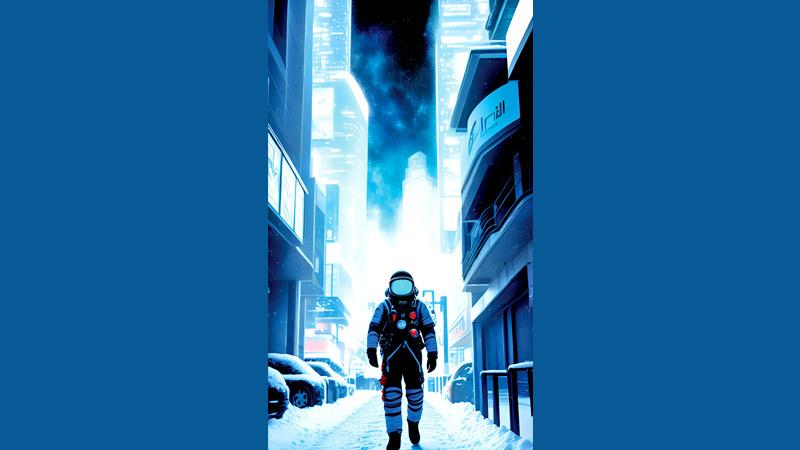
Part 1: Death of Baldr Chapter one
Global South steps up by accepting climate refugees amid new ice age crisis
The onset of the new ice age has disrupted the global economy in unprecedented ways. The freezing temperatures have resulted in widespread crop failure, leading to food shortages and price hikes. The energy demand for heating has increased dramatically, leading to skyrocketing electricity and gas bills.
The effects of the ice age are being felt worldwide, with many people from the Global North seeking refuge in warmer countries in the Global South. However, this has created a new challenge for these countries, as they struggle to accommodate the influx of climate refugees.
Despite the challenges, some countries in the Global South have stepped up to help. Many have opened their doors to climate refugees, offering shelter, food, and other basic necessities. This gesture not only shows compassion but also highlights the global south’s resilience in the face of adversity.
The financial impact of a new ice age could be significant, and many experts predict a global financial collapse. However, the action taken by some countries in the Global South to accept climate refugees may help mitigate the economic fallout. By opening their borders, these countries are not only showing solidarity but also providing a potential boost to their economies.
The global south’s role in accepting climate refugees may also spur policymakers in the Global North to take more proactive measures to address the crisis. It is essential to recognise the interconnectedness of our world and work together to find solutions to global problems.
As the scorching sun beat down on her skin, Shalini watched as yet another group of wealthy foreigners drove by in their shiny cars, searching for the perfect nest. She had seen this all before - the past few years had been a whirlwind of activity as more and more so-called “climate refugees” from the wealthy north flooded to the equator to escape the bitter cold.
It all started with the news reports, talking about the coming of the ice age and how it would force mass migrations. At first, it all seemed like a distant problem, something that would never affect the peaceful, tropical paradise of Southern Sri Lanka. But soon enough, the influx of foreigners began, and the local housing market went wild.
Shalini’s family was one of the first to feel the impact. They had lived in their modest suburban home for a decade, but suddenly, the price of land and property skyrocketed, and they were forced to move out to make way for wealthy newcomers. It was a bitter pill to swallow, and the resentment and frustration that Shalini felt simmered just below the surface.
As she watched another group of foreigners pass by, Shalini couldn’t help but wonder. The future seemed uncertain and fraught with tension, and Shalini could only hope that her family and friends would be able to weather the storm.
“Hey Shalini,” Aruna said, as he walked over to where his sister was sitting in the shade. “How’s the moving going?”
Shalini looked up at her brother, wiping the sweat from her forehead. “It’s going okay, I guess. It’s just frustrating that we have to move out of our own home because of these outsiders.”
Aruna nodded a look of understanding on his face. “Yeah, I know. It’s messed up. These suddas think they can just come in and take over our homes. It’s gentrification at its finest.”
“Gentrification?” Shalini asked, confused.
Aruna leaned against the wall and looked at his sister. “It’s when wealthy people move into a neighborhood, and it drives up the cost of living, making it too expensive for the original inhabitants to afford. The locals are forced to move out, and the neighbourhood becomes a playground for the wealthy.”
Shalini nodded slowly, taking it all in. “I see. So what can we do about it?”
Aruna’s eyes lit up with a newfound passion. “We need to fight back. We need to organise and resist this colonisation of our land. We need to stand up for ourselves and our communities. We can’t just let them take over. We need to fight like our ancestors”.
Shalini looked at her brother, a mix of surprise and admiration on her face. “Wow, Aruna. That’s pretty radical. Where did you learn all this?”
Aruna shrugged. “I’ve been reading a lot on campus. It’s opened my eyes to the injustices in our society, and it’s given me the tools to fight back.”
As Shalini and Aruna continued to pack their belongings, they heard a knock on the door. Shalini went to answer it and was surprised to see their portly landlord standing there with a white couple. The landlord spoke in broken English, telling Shalini that he wanted to show the white folks around the house.
Shalini was taken aback. “Excuse me, what do you mean? We haven’t even moved out yet!”
The landlord simply shrugged and gestured for the couple to come in. They walked past Shalini and Aruna and began to look around the house. The couple was chatting among themselves, pointing at things and taking pictures, seemingly oblivious to the fact that they were intruding on someone’s home.
Shalini was furious. “How dare you barge in here like this? We haven’t even finished packing, and you bring strangers into our home without any consideration for us?”
The landlord scowled and continued to show the couple around, ignoring Shalini’s protests. Aruna stepped in, standing up to the landlord and demanding that he leave. The landlord finally relented and ushered the couple out of the house.
As they left, the couple thanked the landlord and complimented him on the house. Shalini and Aruna could only stand there in shock, feeling violated and disrespected.
To be continued
‘As the snowflakes melted’ sci-fi has been realized by Jonathan Frank in collaboration with Chat GPT.
